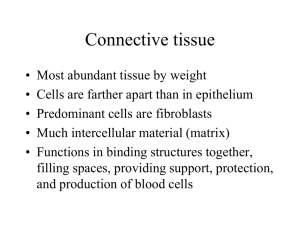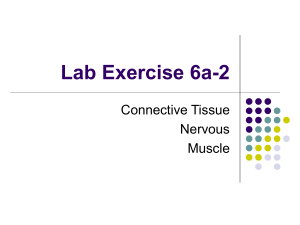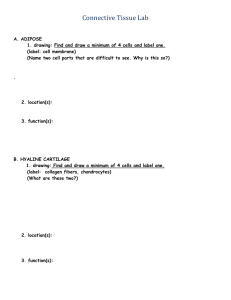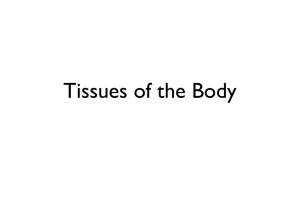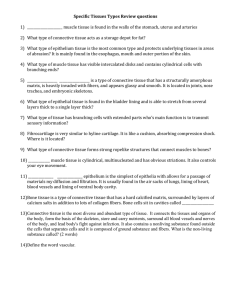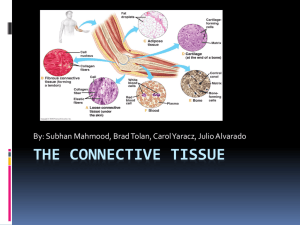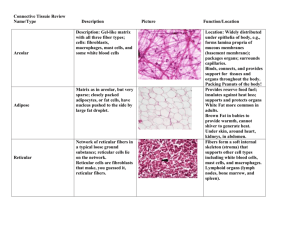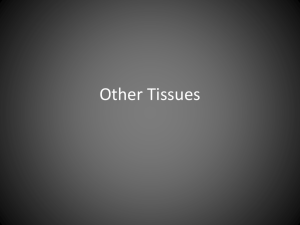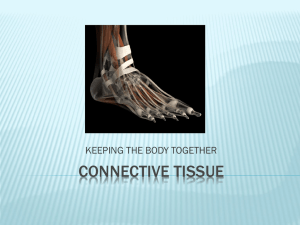Lab Exercise #8 Connective Tissue
advertisement
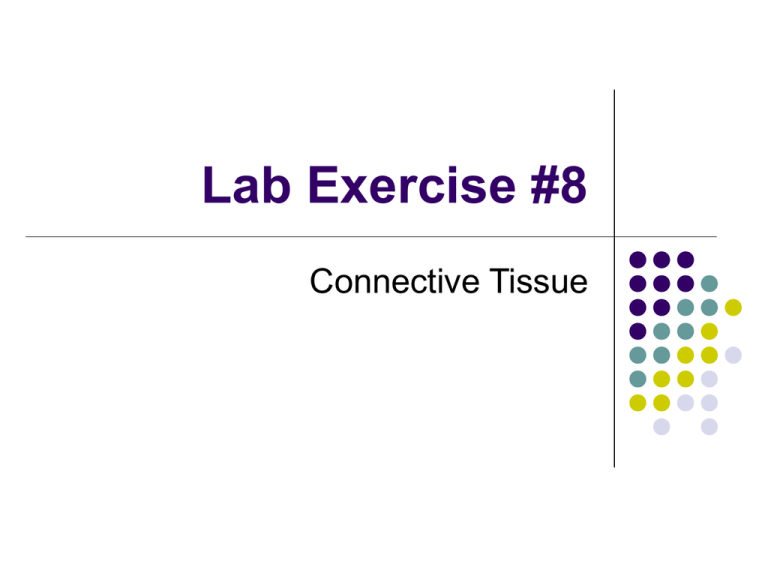
Lab Exercise #8 Connective Tissue Characteristics of Connective Tissues Specialized cells Solid extracellular protein fibers Fluid extracellular ground substance These latter two extracellular features are called Matrix The Matrix The extracellular components of connective tissues (fibers and ground substance): majority of volume determines specialized function e.g. connective tissue proper syrupy liquid cartilage gel-like matrix blood fluid matrix bone crystalline solid Classification of connective tissues Today’s Lab Lab #8. Connective Tissue Connective Tissue Connective tissue proper Fluid connective tissue Supportive connecting tissue Connective tissues Connective tissue proper Loose connective tissue Areolar Adipose Reticular Dense connective tissue Dense regular Dense irregular Elastic tissue Fluid CT Blood Supporting CTs Cartilage Hyaline cartilage Elastic cartilage Fibrocartilage • Bone Areolar tissue A loose CTP Areolar Areolar: what to look for Fibroblasts Collagen fibers Elastic fibers Mast cells and macrophages Found? Throughout body, under dermis, divides skin from underlying tissues Fibroblasts Resting fibroblasts typically have so little cytoplasm that the cells appear, by light microscopy, as "naked" nuclei Fibroblast Adipose tissue Another lose CTP (note nucleus) Adipose: what to look for Lots of cytoplasm Slim nuclei pushed off the side Found? You know where Reticular tissue The third type of loose CTP Reticular tissue Reticular: what to look for Reticular fibers (network) Found? Internal framework in many sort organs (liver, spleen) supporting the parenchyma Dense CTP Dense regular – strength in one direction Dense irregular – strength in all directions Elastic tissue - pliable Dense regular Dense regular: what to look for Thick parallel bundles of collagen Small fibroblasts in between bundles Found? Tendons, ligaments, deep fascia. Dense irregular More dense irregular Dense irregular: what to look for Mesh of collagen fibers (irregular looking) Interspersed fibroblasts Found? Dermis of skin, periosteum, perichondrium Elastic tissue Elastic tissue: what to look for Elastic fibers (instead of collagen fibers) in large bundles Fibroblasts Found? Between vertebrae, in blood vessel walls (underneath endothelium) Fluid CT Blood Blood: what to look for RBCs White blood cells (darker): monocytes, lymphocytes, granulocytes Platelets Supportive CT Cartilage – gelatinous, padding Hyaline cartilage Elastic cartilage Fibrocartilage Hyaline cartilage Glasslike because fibers not visible More hyaline There are collagenous and elastic fibers lying in the cartilage matrix but they are invisible because their “refractive index” is the same as that of the matrix (like cornea) More hyaline Hyaline cartilage Hyaline Hyaline cartilage (lavender matrix), with perichondrium (pink) outside it. The latter is a dense regular collagenous CT. Cartilage cells = chondrocytes, and they are lying in the lacunae. Hyaline cart.: what to look for Perichondrium Chondroblasts (make the matrix fibers and ground) Chondrocytes and lacunae Where? Most joints, nasal septum Elastic cartilage Elastic cart: what to look for Many elastic fibers in matrix Perichondrium Chondroblasts Chondrocytes in lacunae Fibrocartilage Fibrocartilage: what to look for Irregular, wispy collagen fibers Chondrocytes Found? Intervertabral discs of spine, pads in knee joint Supportive CT: Bone Detail of lacuna, showing radiating canaliculi. Tissue fluid from the capillaries and connective tissue of the Haversian canal can seep through these spaces and channels, bringing nutrients to the stellate osteocytes residing there. Bone: what to look for Osteon (whole circular structure) Concentric lamellae (of matrix) Central canal (at center of lamellae) Osteoblasts Osteocytes in lacunae Canaliculi Found? Bones! Exercises Look at all slides Draw an example of each tissue (11) on paper provided 6 CTP (3 loose, 3 dense) 1 Fluid CT (blood) 4 Supportive CT (3 cartilage, 1 bone) Due next Tuesday (6/3) Turn in next Tuesday Drawings of 11 tissues Lab Report 8 (A,B,E)
